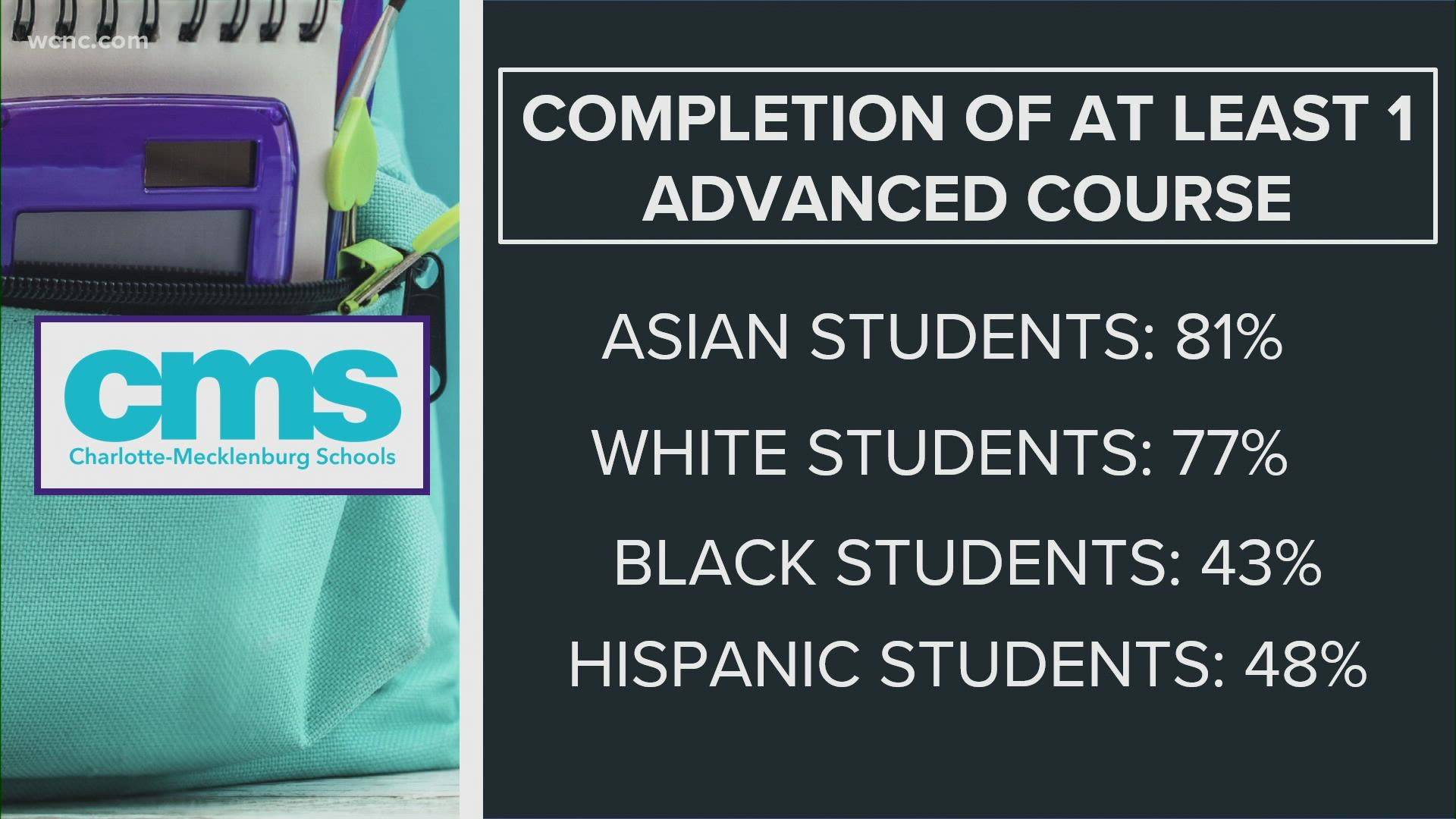CHARLOTTE, N.C. — In Charlotte-Mecklenburg Schools, Black and Hispanic students are seeing a significant disparity in the number of high schoolers completing and passing at least one advanced course by graduation.
In a school board meeting this year, it was shown almost 81% of Asian students and 77% of White students completed this goal. The meeting also showed only 43% of Black and 48% of Hispanic students completed and passed at least one advanced course by graduation.
WCNC spoke with current high school students from East and South Mecklenburg high school who have taken multiple AP courses over the years.
“Last year was like my hardest year taking AP classrooms, because obviously, you know, COVID and everything, everything was in like the computer. So you know, everything was pretty challenging, especially for me, because I'm really like an in-person learner," Gaetana Chavez, who started taking AP courses in her sophomore year at South Mecklenburg High School, explained.
The CMS 2024 strategic plan calls for 75% of all high school students to complete at least one advanced course by graduation. So far, the district is off track for that goal by 19%.
Asian and White students have surpassed that goal and now the district is focusing on how they can get Black and Hispanic students to do the same.
According to CMS data, during the pandemic was when they started to see the number of Black and Hispanic students in advanced courses go down.
This is despite those students being qualified to take them. In the Jan. 2022 progress monitoring report, it said among students with weighted GPAs at/above 2.0 and below 3.0, 20% of Black students and 20% of Hispanic students had never enrolled in a college-level/advanced course. This is compared to just 8% of Asian students and 9% of white students.
CMS Superintendent Earnest Winston has previously said the district needs to work on creating more awareness about the programs.
“I feel like the lack of communication is a really big problem, like from school to parent in school to student. And there's like 500 students that don't speak English, meaning their parents don't either," Tamara Herrera, who attends East Mecklenburg High School, said.
Some students are opting to take dual enrollment courses instead.
"It was just a better alternative and I get college credits for taking those courses," Eduardo Castro said. He is a senior at South Mecklenburg High School who currently takes classes at Piedmont Community College while he finishes his degree. "I feel like I have a variety of classes to choose from. And I believe that AP courses, it is a great start for many students at CMS and that a lot of students should take it because it does benefit them in the long run."
Students expressed a need for more communication from counselors about advanced courses.
“I probably would have never taken five AP courses to have my counselor not encouraged me to do so made me really believe that I could do that," Maxwell Campbell, a student at East Mecklenburg High School, told WCNC Charlotte.
How CMS is approaching the problem
CMS has said it has the necessary resources to help its Black and Hispanic students get into advanced courses before they fall too far behind.
In order to get closer to the district's goal, schools will follow a three-pronged plan consisting of a 30-day strategy, a 30-90-day strategy, and a 120-day strategy.
The plan is separated to address grades 10th-12th, individually.
For the 12th grade, the district planned to reach out to support and monitor the performance of the 59 Grade 12 students currently with a failing mark in a college-level/advanced course. This is in addition to conducting an intentional review of course grades at the conclusion of the third quarter for all students in college-level/advanced courses, including for students who are dual-enrolled.
For 10th and 11th grade students, the district is focusing on recruiting these students with school-wide events, parental correspondence, and direct encouragement from a trusted adult to enroll in a college-level/advanced course. Specifically, those aligned with their strengths and interests.
The next phase is working actively to build student schedules that include the course, ensuring students begin the following school year in those courses and providing ongoing student support and performance monitoring.
CMS said these are existing practices that have recently produced double-digit increases in student enrollments in college-level/advanced courses at targeted comprehensive high schools. They admitted the practices are codified but have begun to erode with staff turnover and pandemic-induced pressures and priorities.
The district said they must be successful in these solutions to attain the upcoming enrollment target in the next two school years.
Contact Shamarria Morrison at smorrison@wcnc.com and follow her on Facebook, Twitter and Instagram.





